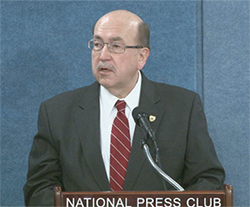
The IAM called on Congress to slow down the campaign for an expedited and secretly-negotiated Trans-Pacific Partnership (TPP) Free Trade Agreement, during a recent panel discussion entitled “Do We Need Fast Track/Trade Promotion Authority?”
“Our national trade policy is leading us once again into a future where U.S. workers have no future,” said IAM International President Tom Buffenbarger, who spoke at the National Press Club in Washington, D.C., alongside Lori Wallach, Director of the Public Citizen’s Global Trade Watch.
“If TPP is implemented,” warned Buffenbarger, “U.S. manufacturing may well find itself on the endangered species list.”
Access to TPP text and negotiations have so far only been granted to U.S. negotiators, deep-pocketed corporations and about a dozen other countries. Under the “fast track” process being pursued by the White House, members of Congress are blocked from negotiations and offering amendments, and can only vote up or down for passage.
Buffenbarger cited past free trade agreements that failed to deliver on promises of job creation, greater U.S. access to foreign markets and increased protection of labor, environmental and human rights for workers at home and abroad.
“We’ve seen it over and over, first with NAFTA, then with the Korea-U.S. Free Trade Agreement (FTA), then the Colombia FTA and now with the TPP,” said Buffenbarger. “These agreements have been a death sentence for hundreds of thousands of American workers in industries that range from autos to agriculture. We simply cannot afford to keep repeating the mistakes of the past.”
Buffenbarger and Wallach both called for greater transparency in negotiations for trade deals with foreign nations.
“The 21st-century trade policy that we advocate will not tolerate backroom deals which depend on keeping critical information from the public,” said Buffenbarger. “It will not grant foreign investors greater rights than domestic companies and will in no way interfere with national and local government’s ability to protect our health, worker safety, and social standards.”